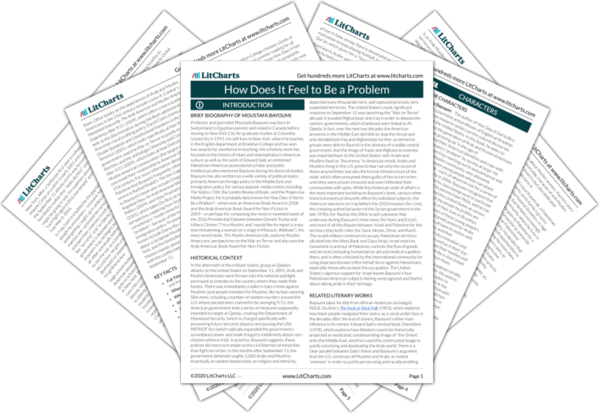Sami Quotes in How Does It Feel to Be a Problem?
“I'm like the most far-off Arab you'll find,” he complained to me one day when talking about his relationship with some of the guys in the club. We were sitting in the backyard of a Starbucks in Park Slope. “You have to be a Muslim to be an Arab. You have to listen to Arabic music all the time to be Arab. You have to be in love with going wherever your parents are from. You have to marry an Arabic girl to be Arab. Certain things. You're not a real Arab if you're like me. I don't listen to Arabic music. I don't watch Arabic programming. I hate going to Egypt. I hate going overseas. I date a Puerto Rican female.”
Around this time he decided on the tattoo he wanted to have, once he'd saved enough money. With his large, muscular bulk, he has acres of skin to plow ink into, but he never wanted to stamp himself with the regular bulldog or the eagle, globe, and anchor symbol of the Marine Corps. If he was going to paint himself, he needed something that expressed who he is, something that really spoke to him. What he came up with was the New York City skyline as the tattoo's basis, but instead of the World Trade Center towers, two memorial beams of light will shine upward. The moon, vaguely imprinted with the marine emblem, will land high on his shoulder. The stars will spell out “N-Y-C.” Underneath, and in Arabic, will be written the words “Always remembered, never forgotten.” A little bit of everything—New York, Marine, Arab—to be put carefully together and marked indelibly.

Sami Quotes in How Does It Feel to Be a Problem?
“I'm like the most far-off Arab you'll find,” he complained to me one day when talking about his relationship with some of the guys in the club. We were sitting in the backyard of a Starbucks in Park Slope. “You have to be a Muslim to be an Arab. You have to listen to Arabic music all the time to be Arab. You have to be in love with going wherever your parents are from. You have to marry an Arabic girl to be Arab. Certain things. You're not a real Arab if you're like me. I don't listen to Arabic music. I don't watch Arabic programming. I hate going to Egypt. I hate going overseas. I date a Puerto Rican female.”
Around this time he decided on the tattoo he wanted to have, once he'd saved enough money. With his large, muscular bulk, he has acres of skin to plow ink into, but he never wanted to stamp himself with the regular bulldog or the eagle, globe, and anchor symbol of the Marine Corps. If he was going to paint himself, he needed something that expressed who he is, something that really spoke to him. What he came up with was the New York City skyline as the tattoo's basis, but instead of the World Trade Center towers, two memorial beams of light will shine upward. The moon, vaguely imprinted with the marine emblem, will land high on his shoulder. The stars will spell out “N-Y-C.” Underneath, and in Arabic, will be written the words “Always remembered, never forgotten.” A little bit of everything—New York, Marine, Arab—to be put carefully together and marked indelibly.











